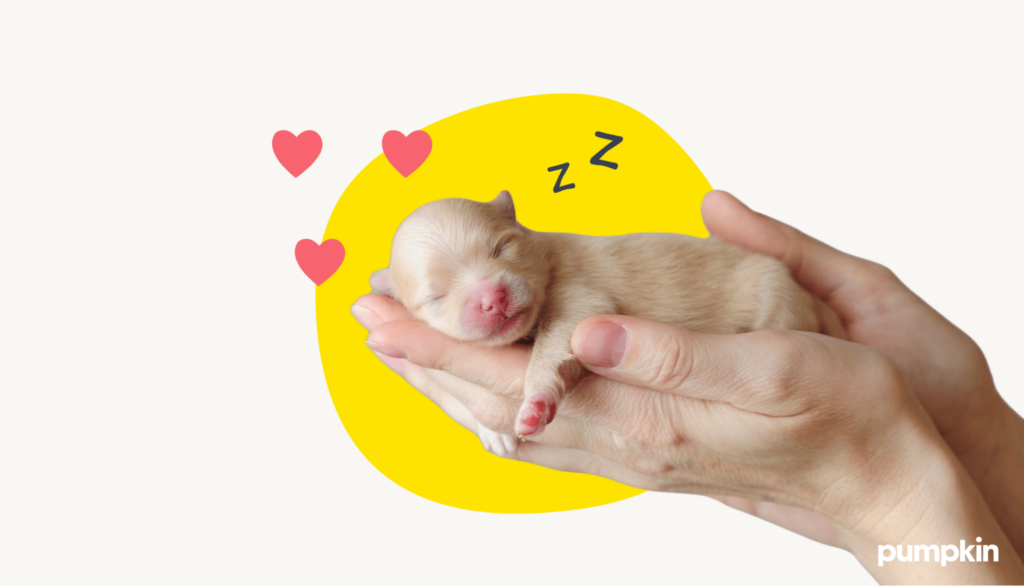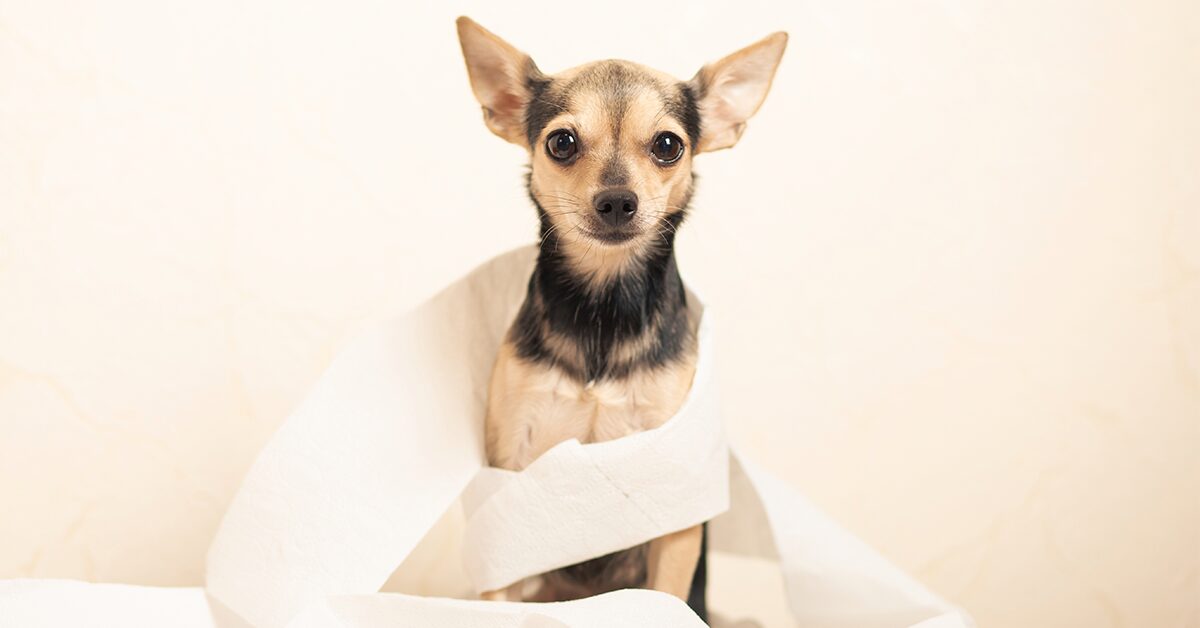Key Points
- Diarrhea in puppies is common and can often be managed at home, but because puppies become dehydrated more quickly than adult dogs, check in with your vet if the diarrhea lasts more than a day.
- If your puppy is under 4 months old, suffering from diarrhea and vomiting, or the symptoms persist or worsen, you should also contact your veterinarian.
- There are many causes of puppy diarrhea, and some may require medical treatment.
As a dog parent, you know that dealing with poop is part of the gig. Keeping an eye on what comes out of your pup is almost as important as watching what goes in. Changes in bowel movements often signal a potential health problem, and puppy diarrhea is a common but concerning issue that can get messy quickly.
Fortunately, loose stools usually aren’t that serious, and you can usually treat mild cases at home. However, a puppy with diarrhea may also have a health condition that requires a trip to your veterinarian.
Diarrhea is more serious for puppies
Although diarrhea in puppies is a common affliction, young pups face additional risks since their immune systems aren’t as robust as adult dogs. It can take up to 6 months for their immune systems to mature, leaving them more vulnerable to health issues like diarrhea during those early months.
In addition, their smaller bodies are at higher risk for dehydration, a common side effect of diarrhea. Dehydration leads to electrolyte loss, lower oxygen levels, and, in the most severe cases, kidney failure.
Common causes of diarrhea in dogs
While loose stools can be a symptom of many conditions, these six causes are the most common:
1. Stress
Puppy life can be overwhelming, with vet visits, meeting new people, and a big move. All that upheaval takes a toll on your puppy’s digestive system, which can lead to diarrhea.
Stress-related diarrhea typically resolves within a day or two if you give your buddy some extra love and downtime to de-stress. This is an ideal opportunity to get your puppy used to quiet time in their crate.
2. Food issues
Puppies have a delicate gastrointestinal tract and can easily get an upset stomach from sudden diet changes. You may also discover that your pup has an allergy or food intolerance to a specific ingredient in your search for the healthiest kibble.
After you bring home your puppy, wait at least a week to switch their food, and then transition them over slowly. Add your pup’s new dog food to their bowl in small increments, replacing their old food gradually over 7-14 days. During the transition, watch for symptoms like loss of appetite, vomiting, or diarrhea.

3. Eating things they shouldn’t
Puppies explore the world with their mouths, which can lead to eating things they shouldn’t. That tennis ball is a fun toy, but your pup may also discover it’s quite tasty. And that sock your toddler dropped? Your pup may gobble it up before you can intervene, causing a tummy ache or a blockage in the digestive tract. Eating things they shouldn’t is one of the most common puppy accidents.
Always supervise your puppy to prevent the ingestion of a foreign object or toxin. If you can’t be present, it’s best to crate-train your puppy for their own safety and well-being.
Call the ASPCA Poison Control line or the Pet Poison Helpline if you suspect your puppy ingested a toxic substance or plant. The sooner you seek professional guidance, the easier and less expensive treatment is likely to be.
4. Intestinal parasites
Puppies often have intestinal parasites because they have weaker immune systems, and their mother can pass some types of parasites to her litter. Roundworms, hookworms, whipworms, tapeworms, Giardia, and coccidia are parasitic infections that can cause diarrhea in puppies.
Other symptoms of internal parasites include:
- Distended belly
- Slow growth
- Poor-quality coat
- Thin appearance
- Bloody diarrhea
- Lethargy
- Visible worms in stools
If your puppy has any of these symptoms, take them to your veterinarian for a proper diagnosis and treatment.
5. Viral Infections
One of the most concerning health conditions in puppies is parvovirus. More commonly known as “parvo,” this contagious viral infection requires immediate veterinary intervention.
Symptoms of parvo include:
- Severe or bloody diarrhea
- Vomiting
- Weight loss
- Lack of appetite
- Lethargy
- Fever
Other viral infections may include distemper, canine coronavirus (not Covid-19), and canine adenovirus. Your puppy’s vaccinations will protect them from viral infections. Take extra steps until they get their full series of booster shots.
6. Bacterial infections
Dogs can also get diarrhea by consuming food or water that’s been contaminated by bacteria like Salmonella, listeria, clostridium, and E. coli. Symptoms of bacterial infection include:
- Vomiting
- Foul-smelling, watery diarrhea
- Black or bloody stools
- Severe dehydration
- Pale gums
- Abdominal pain
If you notice any symptoms of a bacterial infection, contact your veterinarian immediately. Prompt diagnosis and treatment are essential for your pup.
When to call your veterinarian
Most mild cases of acute diarrhea will pass on their own in a day or two, although it can take up to a week or more for your pup to fully recover. However, it’s important to seek advice from your veterinarian if the diarrhea persists for more than a day or is accompanied by other symptoms. Because puppies get dehydrated so quickly, you should also contact your veterinarian if your puppy has diarrhea with vomiting or is under 4 months old.

Your vet may run some tests to check for pathogens like C. diff and parasites like Giardia. They may also do an enzyme-linked immunosorbent assay (ELISA) antigen test and white blood cell count to scan for parvo.
If your vet suspects a bacterial infection, they might prescribe some antibiotics to knock it out. If the tests don’t indicate a specific issue, your vet may suggest switching up your pup’s diet.
Symptoms requiring prompt veterinary attention
Call your vet or an emergency clinic if your puppy shows any of the following danger signs:
- Severe diarrhea
- Vomiting and diarrhea
- Abdominal pain
- Lethargy
- Watery stool lasting more than 24 hours
- Loss of appetite
- Weakness
- Blue gums (indicating anemia, dehydration, or shock)
Home treatments for puppy diarrhea

If your vet rules out viral or bacterial infections, you can help your four-legged friend feel better at home. Here are a few home treatments for a puppy with diarrhea:
- Offer a bland diet that’s easy to digest and low in fat. White rice or chicken with no added ingredients are good options.
- Make sure your puppy has enough fresh water to replace the lost fluids. A good rule of thumb is to offer 1.5 cups of water per 10 pounds of body weight per day.
- Avoid fasting your puppy, as it can lead to health issues.
- Add fiber to your puppy’s diet by mixing small amounts of unflavored psyllium powder with your pup’s food.
- Add options like organic canned pumpkin, probiotics, kaolin-pectin, or electrolyte solutions for chronic diarrhea with your veterinarian’s approval.
It can take up to a week for your puppy’s gut lining to recover and their stool to become normal again. If diarrhea continues, ask your vet what additional steps you should take. However, many bouts of puppy diarrhea resolve themselves with minimal veterinary care.
How to prevent diarrhea in dogs
Take these proactive steps to help keep your pup’s gastrointestinal tract in top shape:
No table scraps
Nutritious puppy food is all your puppy needs — along with a few treats. Table scraps may contain dangerous ingredients, additives, and seasonings. Teach your puppy the table is for humans and not a puppy snack smorgasbord.
Deworm regularly
Parasites can slow your puppy’s growth and cause various health problems. A regular deworming schedule can help your puppy remain parasite-free. If you suspect worms, take a stool sample to your vet for analysis.
Get dog-friendly indoor and outdoor plants
Puppies love to taste everything, but some plants are toxic to dogs. If you have poisonous plants in the house, fence them off or remove them entirely to protect your curious pup.
Crate unsupervised puppies
A puppy’s crate can become their cozy, calm abode when you can’t keep a close eye on them. This ensures they won’t have access to foreign objects that could make them sick.
Avoid dog parks until your pup is fully vaccinated
Paws off dog parks, trails, and mystery mutts until your puppy has had all their shots. Protect unvaccinated puppies from potential infections until your vet gives you the green light.
Gradual dietary changes
Dogs of all ages can experience gastrointestinal upset when switching to a new food. Always transition your pet to a new food gradually to give them time to adjust.
Finally, remember that regular checkups with the vet can help reduce the likelihood of viral and bacterial diarrhea. Prevention is always the best medicine.
Don’t let unexpected illnesses and mishaps catch you off guard. Pumpkin Puppy Insurance plans can help cover the cost of eligible vet bills for accidents and illnesses that pop up in the future. This means you can focus on getting your new pup back to their happy self, without worrying too much about the cost of care.
FAQs about puppy diarrhea
- https://www.kingsdale.com/diarrhea-in-puppies-causes-and-treatment
- https://pmc.ncbi.nlm.nih.gov/articles/PMC6958461/
- https://www.akc.org/expert-advice/health/warning-signs-dehydration-dogs/
- https://www.avma.org/resources-tools/pet-owners/petcare/intestinal-parasites-cats-and-dogs
- https://www.vet.cornell.edu/departments-centers-and-institutes/baker-institute/our-research/canine-parvovirus
- https://vcahospitals.com/know-your-pet/coronavirus-disease-in-dogs
- https://www.merckvetmanual.com/digestive-system/salmonellosis/salmonellosis-in-animals
DISCLOSURE




